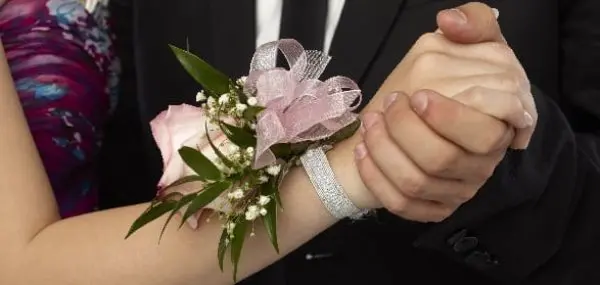Valentine’s Day is just around the corner, so Your Teen caught up with Dr. Adelle Cadieux, a pediatric psychologist with Helen DeVos Children’s Hospital in Grand Rapids, Michigan, to find out what’s “normal” when it comes to teens and romance—and what should make us take a closer look.
Q: What are the signs of a healthy relationship for teenagers?
Cadieux: Most teenage relationships are normal and healthy. Many relationships start with your teenager having a strong interest in a particular person. They may be excited and nervous about seeing and talking to that person. If the other person likes them back, they’re excited and nervous, but it’s an enjoyable experience. Once a teenager is in a relationship, it should continue to be enjoyable. They enjoy being together, they may be each other’s confidante, but you should also see your teenager continuing to maintain his or her relationships with other friends. The teen should still be doing the other things they were doing before this romantic relationship, including sports or other interests. In other words, the romance doesn’t interfere with normal life. It’s an additional, enjoyable part of life.
Q: Middle school versus high school?
Cadieux: In middle school, it’s usually more about seeing each other during classes, at lunch, and school events. Texting each other, communicating through social media. But there is usually not a lot happening outside of school. In high school, teenagers spend much more time together outside of school.
Q: High school is when a lot of parents start to worry about their teenager becoming sexually active with a romantic partner.
Cadieux: Parents should have open discussions about the physical aspects of relationships, but you probably don’t want to wait until they are in high school to start ‘the talk’ for teens. These conversations can be uncomfortable for both parent and teen, but they are so important. The more frequently you have these conversations, the easier it gets. Ask your teen if he or she has any questions about physical attraction, physical affection or sex. Allowing your teen to ask some questions can help the conversation to be directed to the aspects that are important to the teen, but you can also ask, “At what point in a relationship do you want to show affection, hug, kiss and maybe do more? And if you do more, how will you feel about it when you break up?” Try to help your teen get perspective on what it means to enter into a physical relationship. It’s hard for teenagers to have perspective, but these kinds of conversations can help.
Q: Many parents would rather their teenagers wait to have sex.
Cadieux: Talking about sex and talking about safe sex will not make your teen think about sex. They probably have already thought about it and have discussed it with friends. It’s important for parents to find that balance between wanting them to wait, but being realistic that they may not. You have to be upfront. You can say, “This is what we value and what we think is important in a relationship. However, I understand teenagers don’t always abstain and I’d like you to tell me if you are having sex because we need to keep you safe.”
Q: In other words, birth control for teens, as well as avoiding sexually transmitted diseases by using a condom.
Cadieux: A lot of parents worry that if they provide information about safe sex, it gives their teenagers permission to have sex. That’s not true. It’s a balance between saying, “I’m not okay with this. I want you to wait until you are an adult. However, if you make the choice to have sex, you have to be safe. And this is what you need to do to be safe.” Again, you’re sending a message that you don’t want your teenager to engage in sex, but that you definitely don’t want them to engage in risky sex.
Q: What are some signs of an unhealthy relationship?
Cadieux: Look for changes in how your teenager is interacting with other people. For example, is he or she significantly decreasing time with other friends, even his or her closest friends? Is your teenager becoming more irritable, or even explosive, when you set limits on interactions with a dating partner? For example, if a parent sets a limit, like “You can’t go out tonight” or “You need to be off the phone at a certain time,” and the teenager explodes with, “I have to! I need to!”
Q: What may be going on?
Cadieux: Sometimes it means the relationship has become too intense. But it can also be an early warning sign that the relationship has become too controlling. Sometimes the insecurities teenagers have will manifest themselves into controlling a partner because they are so afraid of losing that partner. They feel: if you don’t respond to my texts or phone calls or you don’t come over when I ask you to right away, you must not love me and you’re going to leave me. This puts the other teenager in a difficult position. Your teenager may really like, even love, a partner and want to be with him or her, but may not know how to handle these kinds of demands. This is stressful. And when a parent tries to set limits, it can feel like the parent is ruining the relationship.
Q: So, how do we approach this?
Cadieux: Wait for your teenager to calm down, then have a conversation. You can say, “You get very upset when you have to get off the phone or if you can’t go see your boyfriend or girlfriend. I want to talk about what is going on. How do you feel?” Try to elicit from your teenager what’s happening. Is it his or her own insecurity? If it is, you can assure them it’s going to be okay. If it’s the insecurity of the partner, then you need to help your teenager to set appropriate limits. Suggest that if your teenager’s partner can’t handle not having that instant response, even if it’s 3 o’clock in the morning, then that is the partner’s problem and and maybe this is someone you shouldn’t be with.
Q: What about signs of dating violence?
Cadieux: You will likely see a dramatic change in the mood and behavior of a teenager who is in an emotionally or physically abusive relationship. These can also include hygiene changes. For example, in these relationships, girls worry if they are too pretty at school, looking as if they are attracting other potential partner and making their partner angry. So, very significant changes in appearance are one warning sign. Changes in wardrobe, such as more long sleeves in, say, hot weather. They may be trying to cover up marks on their body or just trying to hide their body, again so as to avoid attracting other potential partners. A parent may also observe significant withdrawal from family and friends, and no longer involved in their extracurricular activities. Grades in school may decrease and their functioning in general may deteriorate … all signs that should make you concerned.
Q: What do you do?
Cadieux: Again, those conversations with your teenager are very, very important. But if you are at the point where you cannot get through to your teen, you need to seek professional help at that point. A professional can help guide your teenager out of that relationship and feeling better.





